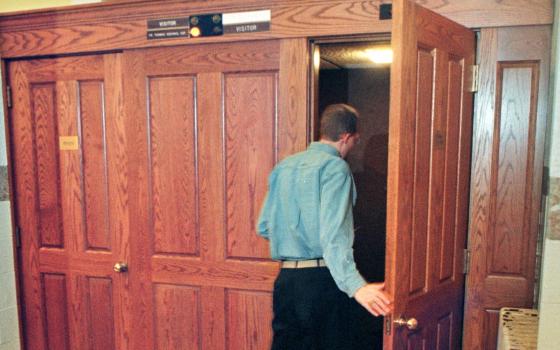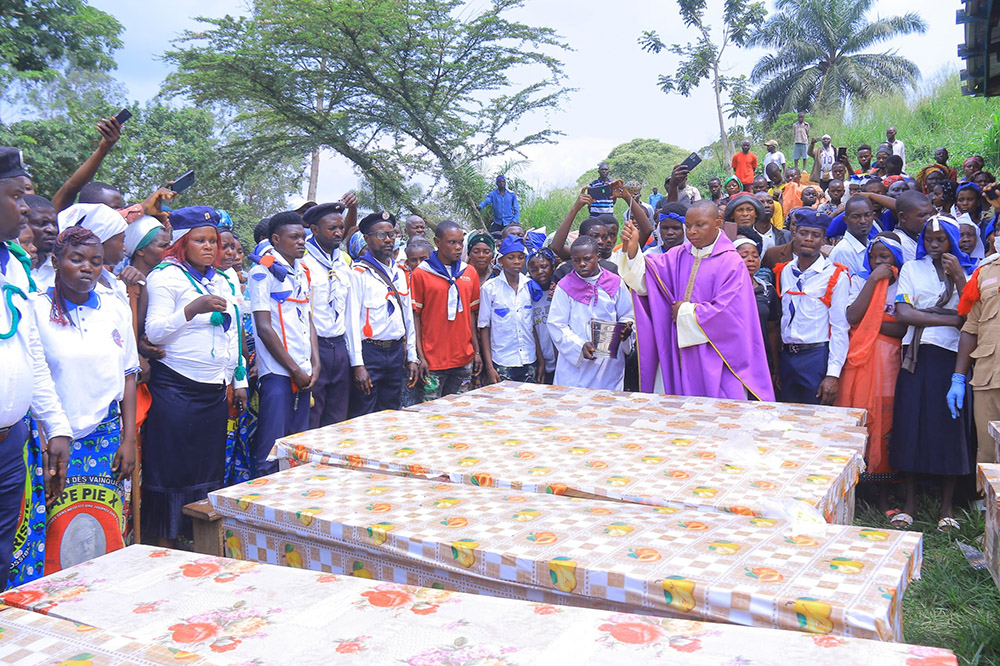
Fr. Aime Lokana Dhego sprinkles holy water on caskets during a funeral Mass in Komanda, in Congo's province of Ituri, July 28, for victims of a horrific attack on the Catholic church in Komanda. At least 40 faithful were shot or killed with machetes during an overnight vigil in the church July 27. (OSV News/Courtesy of Fr. Justin Zanamuzi)
As peace talks move forward between Rwanda and Congo, Congolese Catholics, including religious, spoke to Global Sisters Report about the ongoing violence, displacement and sexual violence in eastern Congo.
Despite signs of diplomatic progress — including a June peace deal between the two countries signed in Washington, D.C., and a July ceasefire declaration signed with M23 rebels in Doha, Qatar — armed groups continue to slaughter civilians and displace communities. In the latest example, militants massacred at least 40 people, including children, during a prayer vigil at a Catholic church in Ituri province.
The July 27 attack in Komanda, in the northeastern part of the country, targeted members of the Eucharistic Crusade, a Catholic movement for children and youth. Survivors say the attackers, believed to be militants from the Allied Democratic Forces, or ADF, burst into the church compound in the early hours of the morning, shooting and hacking worshipers to death with machetes.
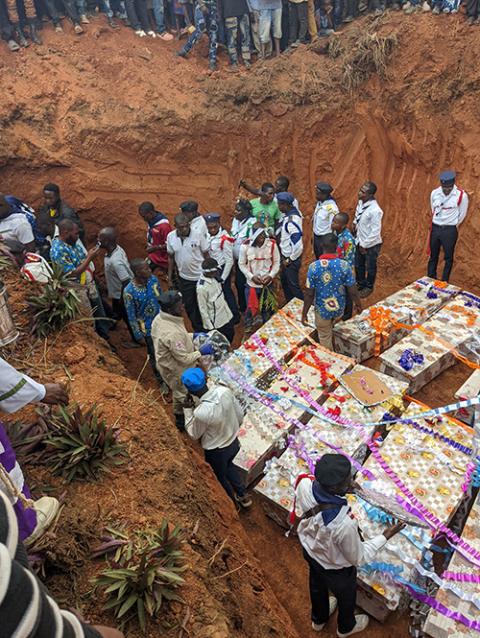
Civilians stand around caskets during a burial in Komanda, in Congo's province of Ituri, July 28, for victims of a horrific attack on the Catholic church in Komanda, where at least 40 faithful were shot or killed with machetes during an overnight vigil in the church July 27. (OSV News/Reuters)
"It was around 1 a.m. when the rebels came. They stormed the church and slaughtered so many innocent children — some were hiding inside, others were caught in the compound," said a layperson from the area, requesting anonymity. "We are devastated. All we can do now is pray, pray for peace to return to this wounded land, and for the strength to endure such heartbreak."
Witnesses told Global Sisters Report the militants — members of a group that has pledged allegiance to the Islamic State — torched homes and shops before disappearing into nearby forests. A local U.N.-backed radio station reported that the ADF fighters had traveled nearly 8 miles to carry out the massacre.
The Komanda attack is just the latest tragedy in a country besieged by violence. Since early 2025, eastern Congo's North Kivu and South Kivu provinces have seen intensified attacks by the M23 rebel group, which has displaced hundreds of thousands, according to the International Organization for Migration.
While international mediators describe recent peace agreements as important and historic, Catholic sisters and a priest said humanitarian conditions on the ground are unbearable — and they need help.
"We really are appealing for help because the situation is really bad," said an Oblate Sister of the Assumption stationed at a hospital in Goma, requesting anonymity for security reasons. "We have not received any support for women in our hospital because we have never had the opportunity to talk about what we encounter in our apostolate for our mothers and daughters who suffer violence before our eyes."
She described a small church-run hospital overwhelmed with survivors of rape, many of them young girls, who arrive without medical records, clothes or support. "We lack even the most basic surgical kits, counseling tools, or food," she said. "Some of these women come to us from forest hideouts, and they are carrying deep trauma. If you can help us, you will have saved millions of women's lives in eastern DRC, in these two occupied provinces."
In 2024, the United Nations estimated that more than about 7.1 million people were internally displaced in Congo, and 23.4 million people faced hunger and malnutrition.
The conflict has also triggered a devastating mental health crisis. "The scars of trauma, displacement, and loss are everywhere," said a catechist with the Catholic Diocese of Goma, who spoke to GSR on condition of anonymity. "It's not just about hunger or disease. People here have lost their families, homes, churches and dignity."
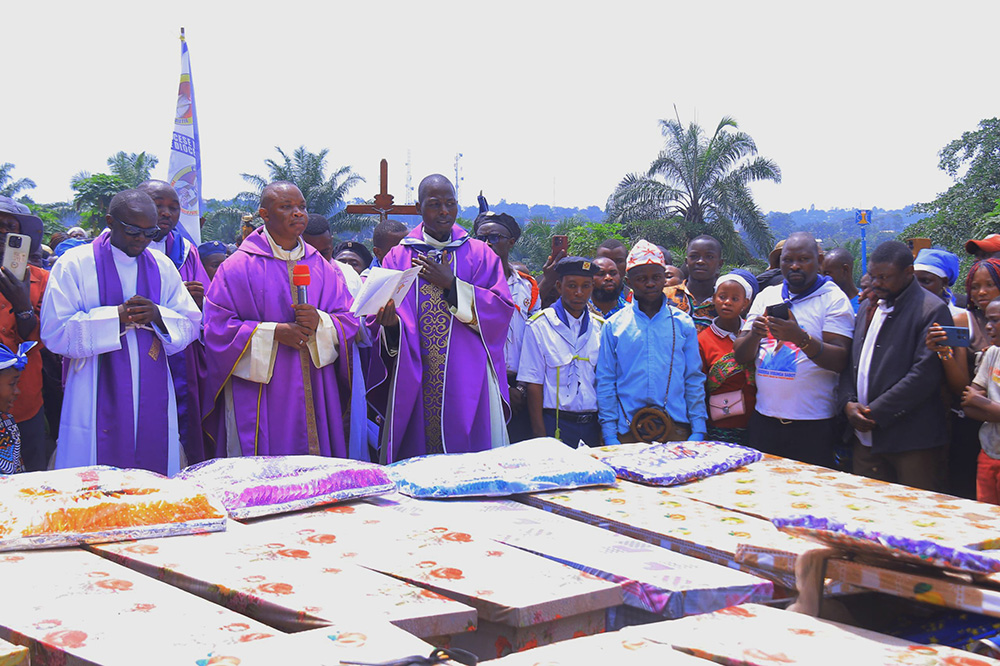
Fr. Aime Lokana Dhego, center, celebrates a funeral Mass in Komanda, in Congo's province of Ituri, July 28, for victims of a horrific attack on the Catholic church in Komanda, where at least 40 faithful were shot or killed with machetes during an overnight vigil in the church July 27. (OSV News/Courtesy of Fr. Justin Zanamuzi)
Church on the front lines
In Goma, Fr. Adeodatus Muhigi, of Église Catholique St François Xavier Ndosho, is coordinating with local and international aid groups to help meet rising needs. But he says church-run efforts are underfunded, understaffed and overwhelmed.
"We write to you with heavy hearts and a great sense of urgency regarding the escalating humanitarian crisis affecting thousands of innocent lives in Eastern Kivu," he said in a letter to GSR. "The suffering endured by children, young girls, women, and elderly people in refugee camps has reached unimaginable levels."
Muhigi outlined four urgent needs: mosquito nets to fight malaria; clean, potable water; trauma-care medical supplies; and psychosocial services for women and children affected by sexual violence and war.
"Whatever donation — no matter how small or large — you make will find its way into the hands of those living life-or-death circumstances with very little prospect of survival," he said. "We are trying to be the hands and feet of Christ, but our hands are tied by lack of resources."
Advertisement
In Kolwezi, in the southern province of Lualaba, Sr. Bernadette Muindi, a Kenyan Good Shepherd Sister, said her ministry has shifted almost entirely from long-term development work to emergency response.
According to her and local partners, more than 500 displaced families are now living in makeshift settlements in and around Kolwezi. They estimate 60% of displaced children are unable to enroll in school due to lack of identification papers or school fees.
Muindi's team at the Bon Pasteur Programme, which originally focused on combating child labor in cobalt mines and promoting women's rights, has now pivoted to offering emergency schooling, hygiene kits, trauma counseling, and food distributions. Still, the scale of need far outweighs the resources.
"This experience has been a profound journey of grace, challenge, and reflection. … But the demand is overwhelming," she said.
'It's not just about hunger or disease. People here have lost their families, homes, churches and dignity.'
—Catechist in Diocese of Goma
Peace on paper — but not yet in practice
On June 27, 2025, Congo and Rwanda signed a U.S.-brokered agreement in Washington, D.C., known as the Washington Accord, aimed at ending years of proxy warfare. The accord requires both countries to withdraw support for armed groups, including the M23 and the Democratic Forces for the Liberation of Rwanda, or FDLR, and will establish a regional framework for mineral trade transparency and economic integration.
Rwandan President Paul Kagame gave the deal a cautious welcome, but insisted that implementation — particularly the neutralization of the Hutu-led FDLR — is nonnegotiable.
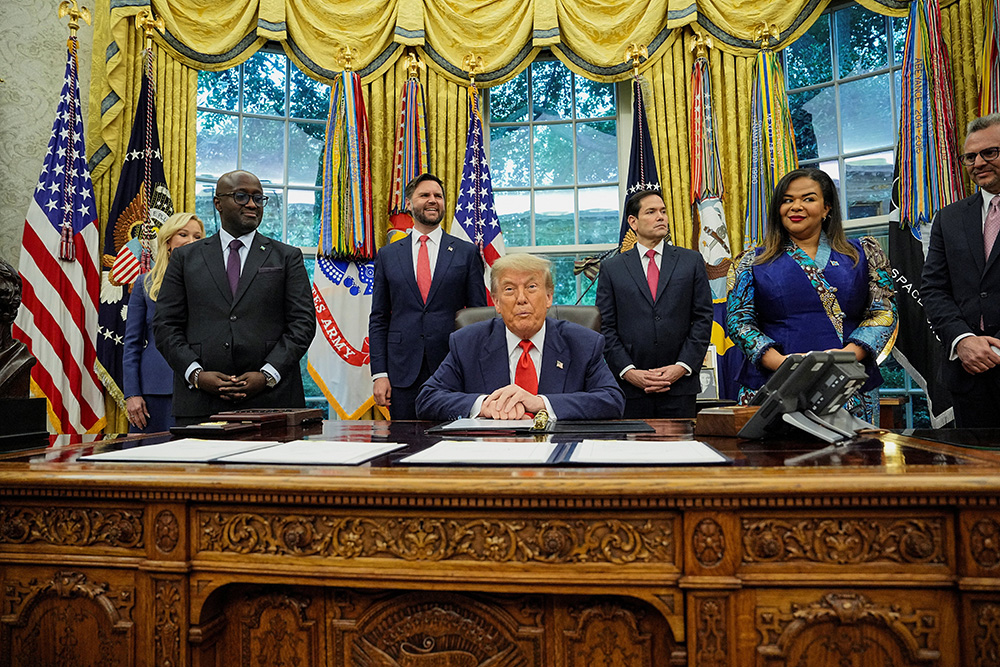
U.S. President Donald Trump, Secretary of State Marco Rubio and Vice President JD Vance pose with Rwanda's Foreign Minister Olivier Nduhungirehe, far left, and Democratic Republic of the Congo's Foreign Minister Therese Kayikwamba Wagner, far right, during the signing of a peace agreement in the Oval Office at the White House in Washington June 27. (OSV News/Reuters/Ken Cedeno)
The agreement was followed by a second key milestone: the July 19 Doha Declaration of Principles, signed by the Congo River Alliance/M23 Movement and the Congolese government under the mediation of Qatar. That agreement outlines a roadmap for ceasefire and joint mechanisms to implement it — a development praised by the U.N. peacekeeping mission MONUSCO.
"This important declaration marks a shift towards easing tensions and protecting civilians seriously affected by the conflict," said Bruno Lemarquis, Acting Head of MONUSCO and deputy special representative of the U.N. secretary-general in the Democratic Republic of the Congo. "We commend the commitments made and call for their timely and good-faith implementation."
While the diplomatic language is hopeful, the Oblate sister in Goma remained skeptical.
"Agreements are only words unless they are followed by action — by disarmament, justice, and care for the victims," she said. "We cannot preach peace while people are bleeding and starving."
A call to compassion
As violence continues, faith-based organizations have become the de facto emergency responders in much of the country. Yet their work often goes unnoticed by the international community and underfunded by humanitarian donors, Muhigi, Muindi and the Oblate sister told GSR.
As of February 2025, the U.N.'s Humanitarian Response Plan for the DRC — which aims to reach 11 million people — had witnessed a sharp decline in donations.
"Maybe you will be the angel of happiness to save so many souls who suffer and die peacefully," the Oblate sister said in a quiet plea to the world. "Even the smallest gift can be the difference between life and death."
Muhigi invoked the words of Jesus from the Gospel of Matthew: "Whatever you did for one of the least of these brothers and sisters of mine, you did for me."
"With [well-wishers'] help," he added, "we can bring hope where there is despair, and light into the darkness."




